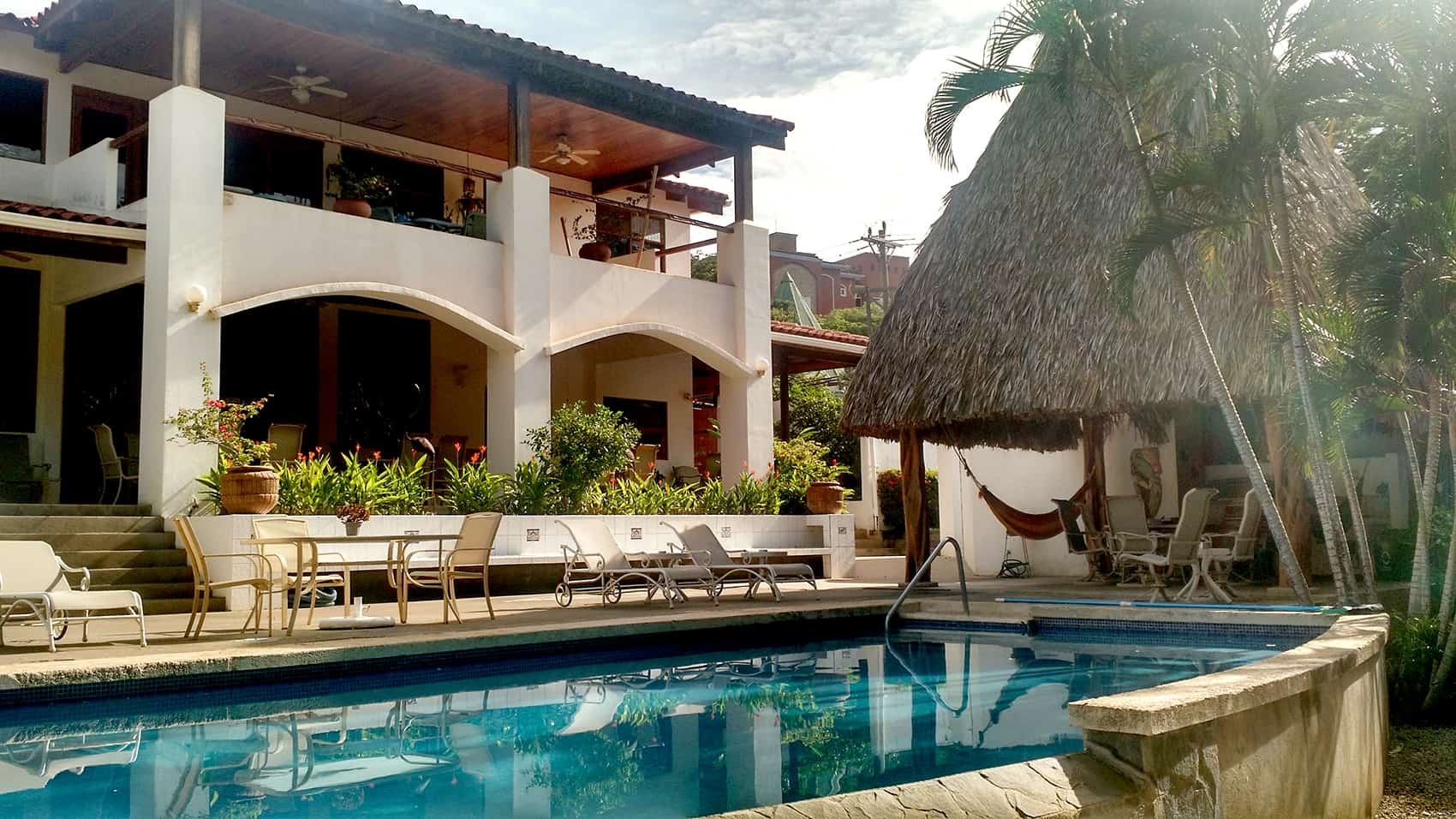TAMARINDO, Guanacaste – At first the scream was buried under the noise from the TV. Barry was a news junkie, after all, so Suzye, his wife, had gone into the other room to take a phone call before she heard it.
She hung up to see what her husband was yelling about when the words cut clearly through the April night.
“Run, Suzye!” he screamed. “Run!”
Just as she heard the warning, skinny limbs reached around her to tackle her to the ground. She could feel the intruder shaking as he put his hand over her face. Shaking the whole time. His teenage body shook with every move he made.
With a T-shirt hiding his face, the attacker threw Suzye headfirst onto the couch.
“No hable,” he whispered. “Don’t talk.”
Every time she made a noise or lifted her head up from the couch to see where Barry was, the intruder poked her with the tip of his knife.
When she tried to escape, he hit her. He covered her face with plastic wrap and tied her hands with cable ties.
It was almost totally quiet on the second floor of the cozy Tamarindo bed and breakfast that Suzye, 69, and Barry, 74, had successfully run for nearly two decades. Guests barbecued and checked emails downstairs without any idea of the nightmare unfolding above them in the Lawson’s private quarters at Villa Alegre.
The other intruders, an older man giving the orders and another teenage-looking boy, dragged Barry to two safes located in separate closets that collectively contained tens of thousands of dollars.
“They knew exactly where to take him,” Suzye Lawson said.
Barry refused to open the second safe, in the guest bedroom, which contained $32,000 in cash. The Lawsons had raised most of that money for their Amigos de la Educación nonprofit organization, which gives scholarships to young Costa Rican students who wouldn’t otherwise be able to afford schooling.
The men hit Barry, this time on the head, convincing the couple they had no other choice but to give the thieves the safe combination.
Six days later, Barry Lawson was dead. Now, more than six months later, members of this diverse beach community are still waiting for justice for Barry and his widow, Suzye.
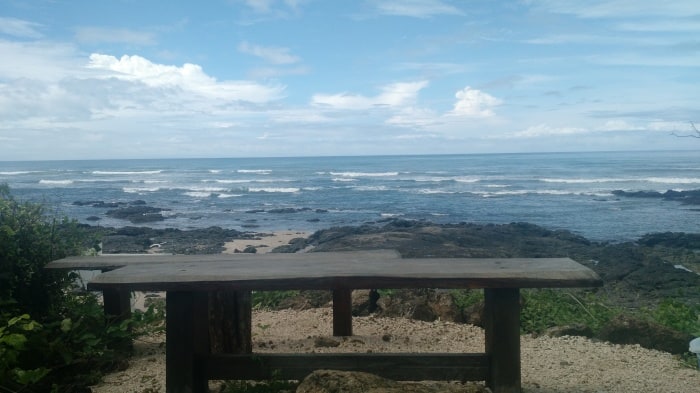
The gap between worlds
To get from Tamarindo to the municipality of Santa Cruz, travelers pass a succession of fincas populated with the sheltering frames of flowering cenízaro trees and the hanging yellow leaves of caña fístula before crossing over the shallow Diriá River. It’s just a 30-minute drive, but the residents of Tamarindo often say they feel a world away from the region’s municipal seat.
Water is often scarce in an area currently undergoing a historic drought. But beyond the most basic necessities, townspeople clamor most loudly for a more effective police force.
“Security always is the No. 1 priority for the people who live here,” said Jogi Gerner, a 20-year resident and coordinator of the Tamarindo Integral Development Association (ADI)’s security committee. “When we have security then we know we can take care of the rest.”
In recent years, ADI’s board, made up of community members, has filled in areas overlooked by the municipality, especially regarding public security. Gerner and the other committee heads hold regular meetings with police from Santa Cruz and Tamarindo to discuss ways in which officers can be better prepared to take action against crime in town.
But lack of resources is a perennial problem.
On March 20, 2015, less than two weeks before the robbery and assault at Villa Alegre, the National Police delegation in Tamarindo was forced to shut the doors of a cabina it rented because it owed $30,000 in back rent, according to Santa Cruz Mayor Jorge Chavarría. Disputes have followed between the municipality and the Public Security Ministry, which oversees the National Police, regarding who should cover the cost of that rent.
The town’s police officers have since moved to the second floor of an apartment building owned by the Hotel Diriá Group. The hotel company will cover the cost of housing the police until next April, when they’re expected to find more permanent offices.
National Police Director Juan José Andrade told the Spanish-language daily La Nación last April that the lack of stable, long-term quarters for the police should not be cause for concern.
“The closure may generate the perception from citizens or tourists that the police have been absent,” he said. “But in actuality, they have been patrolling and bringing security to citizens.”
When more than 300 residents gathered three days after Barry’s death at an April 10 town hall meeting at the Surf Club Sports Bar in Playa Langosta, they hoped to clarify exactly what type of security the police brought to the town.
By then, residents had all heard that multiple calls from Villa Alegre to 911 — and others made directly to the police — went unanswered after the attack. They also had heard rumors that it took an entire day for Tamarindo and Santa Cruz police to arrive at the scene, and two more days for investigators from the Judicial Investigation Police (OIJ) to begin looking into the crime.
Residents and ADI leaders had some obvious questions to pose to municipal officials and area police following the hotel attack. And just when they had hoped to channel those complaints straight to the source, National Police officers from Santa Cruz abruptly left the meeting, claiming the location was unsafe because alcohol was being served.
To those who were there, that premature departure only reinforced the perception of an apathetic police force.
Pat McNulty, a Tamarindo resident who worked for 25 years as a police officer in Providence, Rhode Island, said that when the cops left it felt as if they were turning their backs on the town.
“I can understand why they walked out,” McNulty said. “But it was inappropriate for them to handle such a grievous thing in that fashion. It fortified what people think about police not caring.”
At the meeting, Gerner and ADI members talked about suing the government, as many residents expressed built-up frustrations with the police and the Santa Cruz municipality.
One of the only representatives from Santa Cruz who remained was Mayor Chavarría. He spoke to the crowd about the sometimes rocky relationship between Tamarindo and its municipality, saying he felt Tamarindo deserved a larger police presence.
“Tamarindo gives lots of money to the municipality,” he said to those gathered. “So what can the municipality do for Tamarindo?”
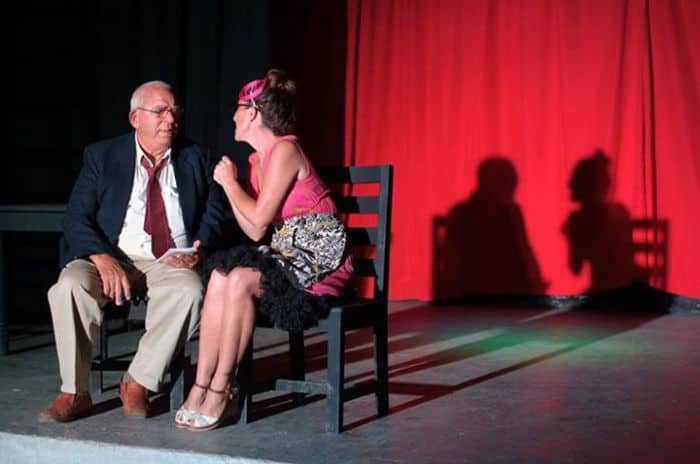
A pillar falls
A quiet tide washes over the silver slabs of rock on Playa Langosta, Tamarindo’s neighbor to the south, renowned for its world-class surf.
Atop the postcard-worthy overlook, at the end of a footpath of pebbles behind the villa is a wooden bench. From its anchored spot, the view opens up to an immense blue mesh of sky that won’t rain – and ocean that won’t fade.
Barry Lawson made that bench in 1996, Suzye’s first year there with him, so that they could go out to together with a glass of wine and watch the sun fall behind the Pacific.
The couple dated for eight years in California before marrying. Suzye had waited a long time for Barry to finally ask. Once, while going through a tour of wine country in Napa Valley, they met another couple that they ended up getting to know. Over dinner, the couple commented on the obvious chemistry between Barry and Suzye, and asked how long they’d been married.
“Oh we’re not married,” Suzye said.
“But I’m going to ask her to marry me soon,” Barry interjected just before Suzye spit out the food she was chewing onto the other man’s shirt.
When Barry said he was going to do something, there was no question it would get done.
He built the beautiful, two-story main house at Villa Alegre in a year, alongside a team of workers. When the construction workers had hoped to call it a day because it was late afternoon and they were missing a piece of wood, Barry would go out and buy the wood to make sure the job got finished on time.
At Christmastime, Barry would drive around Tamarindo on a red ATV dressed as Santa Claus, passing out gifts to kids. It didn’t matter that he had to wear heavy polyester in December, the beginning of Costa Rica’s summer. All that mattered to Barry was that local children could enjoy a Christmas tradition.
Resident Shannon Vaca told The Tico Times in April that Barry helped look out for her kids all the time.
“Barry was like their Gringo grandpa,” she said. “When I was in the hospital my kids stayed with him for a week and he took care of them. When I had an argument with my daughter, she’d go talk to Barry and he’d take her side, just like grandpas do.”
In 2000, a few years after erecting the hotel, the Lawsons began their grand community project: Amigos de la Educación. The organization’s scholarship fund helped out noted students and teachers from area schools who wouldn’t have the means to put themselves through university. Amigos de la Educación also donated thousands of dollars worth of textbooks to schools in Guanacaste province.
“We have always tried to do good things,” Suzye said. “I think it comes back. I think you treat people right. I think you contribute to your community. And life is pretty decent.”
Months before the break-in, a document from the U.S. Treasury Department arrived, informing the Lawsons that the nonprofit money they had in their Costa Rican bank account would be taxed. After consulting their attorney, the Lawsons decided they had two choices: keep the money in the bank and let the U.S. government get a chunk, or hold the $27,000 in cash.
“I’m not going to be taxed on this money,” Suzye said. “It’s not that kind of money.”
Much of the money had been raised from the annual “Have a Heart” charity golf tournament at nearby Hacienda Pinilla, which was held every Valentine’s Day. The $27,000 was going to be given to the students, while Barry and Suzye had $10,000 more in the same safe for their retirement. They had put their bed and breakfast up for sale and planned to semi-retire, traveling the world together while returning to Tamarindo a few times a year to make sure the kids they sponsored were still going through their school requirements.
So it made sense that on the night of the attack, Barry balked at opening the safe located in the guest bedroom. After the attackers beat him, Barry was too shaken up to remember the combination. Suzye had to be dragged to a desk where she had the code written in a notebook. The thieves took all of the money, including $5,000 the couple had in another safe in the master bedroom. They also stole a collection of rare coins, three cellphones, a laptop, a tablet, Suzye’s jewelry, and even a copy of Barry’s will.
Then they yanked Barry’s wedding ring off his finger. They even took the stacking rings that Barry had given Suzye for Christmas, ripping them off as she held her hands together in a ball.
Calm after the storm
Like a hurricane ripping through paradise, when the harrowing ordeal ended, quiet returned.
On the second floor of the villa, mattresses were overturned, plastic wrap coated the floors, the safes lay broken, and spaces once occupied by valuables were taken over by an unfamiliar void.
Meanwhile, the intruders left as discreetly as they came, without any of the hotel’s guests knowing what had happened above them. The attackers had entered through the front door that the Lawsons kept unlocked whenever Villa Alegre had high occupancy.
The bed and breakfast’s front door leads into a narrow hallway that goes directly to the stairs, with an opening to the left-hand side leading to a lounge and kitchen.
A family of Costa Ricans staying at Villa Alegre was having a barbecue on the patio by the pool, out of sight of the front door. A surf instructor and his student were checking the Internet in the downstairs lobby, where they would have only been able to catch a quick glimpse of the men. They later said they assumed the young men who walked in and went straight upstairs to the private quarters were personal friends of the Lawsons. With Barry and Suzye being so active in the community, especially with students, it wouldn’t be strange to think three young-looking men knew them well enough to head directly up to the villa’s second floor.
On their way upstairs, the attackers wrapped beach towels and shirts around their heads and walked into the main living room where Barry was watching the news.
When the horror was over, Barry escaped from the web of belts and cable ties and ran downstairs and tried to call 911 three times. No answer. Barry and Suzye tried calling the Tamarindo police department’s eight-digit number directly. No one answered.
The police didn’t show up until the next day.
It took OIJ investigators three days to arrive, and the Lawsons were instructed not to touch the crime scene, leaving frozen a nightmare to which they had to awake every day.
“The real drama started after that,” Suzye said.
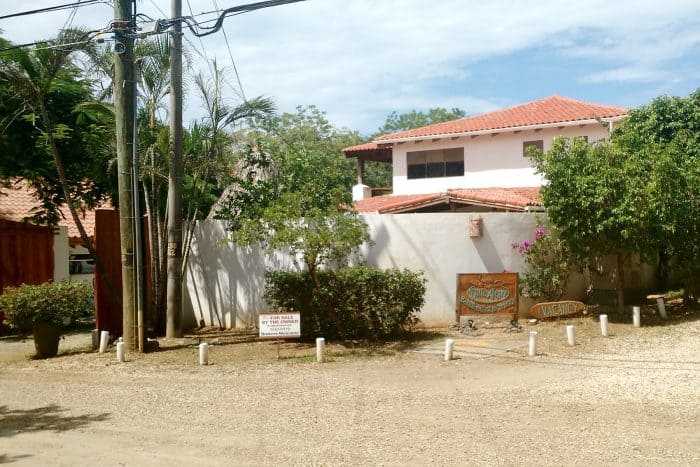
Eyes of night
While Barry struggled to free himself, the hushed night hung like a secret over Villa Alegre. A wooden gate remained open between the unblemished white stone walls as three men jumped into a getaway cab waiting beyond the barrier. Depending on whom you ask, or which rumors you’ve heard, the cab was lime green, red or white.
The man whom OIJ investigators asked was a security guard from a hotel across the street. The guard is the OIJ’s primary witness. But, according to detective Rodolfo Vasquez, the guard’s story has changed every time they’ve spoken with him.
“It’s hard,” Vasquez said in a recent phone interview. “It’s a very hard case. There aren’t many witnesses and there is very little information that we’ve been able to retrieve.”
Vasquez said the Santa Cruz OIJ delegation is still waiting for autopsy results more than six months after Barry’s death. Investigators still say they can’t prove a cause of death, despite the fact that The Tico Times was able to obtain a death report issued by the U.S. Department of State. The report cites autopsy No. 2015-00891 and states that Barry died of “acute subdural hematoma” caused by a traumatic brain injury.
“The cause of death is unclear,” Vasquez told The Tico Times earlier this month. “We still have to wait on the autopsy.”
Vasquez has visited Suzye Lawson at Villa Alegre once since the invasion, although, like the color of the getaway car, the date of the meeting changes depending on whom you ask. Lawson said Vasquez came on April 4 to ask her questions. Vasquez told The Tico Times the two met three months ago, and that he and other investigators from OIJ have tried to follow up with Suzye.
Suzye said she regularly checks her messages and that one of her three workers would have alerted her immediately if OIJ had called or visited the hotel.
Lawson said that when she met the attorney representing OIJ in Santa Cruz and a translator in September, they called Vasquez to get an update on the case. Lawson said she had tried getting ahold of Vasquez for an entire month beforehand, without any luck. When attorney Raquel Sánchez called, however, Vasquez picked up the phone on the first try, Lawson said.
After the call, Sánchez told Suzye through the interpreter that Vasquez and the OIJ were going to throw out the case if the cause of Barry’s death was not proven to have directly occurred from the blow to the head during the robbery.
When The Tico Times reached Vasquez for comment, he denied that claim, saying there would still be an open investigation into the robbery.
Since the intruders seemed to know exactly where the safes were located in the hotel, Vasquez told Suzye during their April meeting that whoever planned the robbery was likely someone they knew. He told her that he was going to follow up with certain people who knew the couple had been withdrawing money from their bank account, or workers who had been preparing the house for sale and had worked on the second floor.
“Anybody that knows the town thinks it’s an inside job,” Suzye said. “How does anyone know that someone has two safes?”
A network of security cameras that the police and ADI set up in 2014 could have possibly identified the getaway cab. But the monitoring program ended months before the break-in at Villa Alegre. Police said they didn’t have enough manpower to watch over the camera feeds at their offices.
Frustration with the program peaked when it was discovered that a liquid, presumably a soft drink, had been spilled over some of the equipment, effectively ruining it.
While some details of the robbery float through the small beachside town in the form of quickly dismissed rumors and empty hearsay, actual facts that could have solidified the investigation were lost when the camera initiative stopped.
Trevor Bernard, ADI treasurer and one of the leading members of the security committee, said the security camera program began with optimism on both sides but collapsed when police couldn’t hold up their end of the deal. He said some of the equipment was damaged by the time it returned to ADI.
“They didn’t want to sacrifice people off the street to be monitoring the police cameras because they had very few people patrolling the streets as it was then,” Bernard said. “So it went some time just sitting there. After a certain period of time we decided it was just better to take the equipment back, and when it came back, part of the equipment was not functional.”
Another coordinator for the ADI security committee and leader of the security camera plan, Jogi Gerner, said that local taxpayer money funded some of the program.
“It went well off to start but the police couldn’t fulfill their promise to monitor the cameras,” he said.
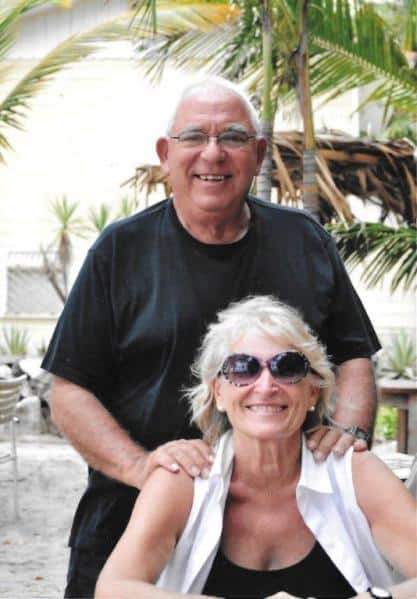
An undying wind
At least three more home invasions and robberies have occurred in Tamarindo since Barry’s death, according to members of the ADI security committee. Yet police say the community’s frustration with them is misguided.
“In the last few months, the authorities and especially the police in Tamarindo are working with great effort,” said Santa Cruz Police Chief Noé Guerrero. “More than anything, it’s in prevention of property crimes.”
Though the chorus of locals agrees that everyone started worrying more about safety after Barry’s death, Guerrero said an abnormal number of break-ins is not happening in Tamarindo.
“Based on our statistical analysis, home invasions don’t occur a lot in Tamarindo,” Guerrero said.
In April, Gerner and his fellow heads at the ADI security committee circulated a petition directed towards police to plead for improvements in security. At the meeting where National Police officers made an early exit, they hoped to show the document to police and have them sign it, ostensibly agreeing to a list of expectations.
“People thought if the police would have reacted better then maybe this would not have happened,” Gerner said.
Since April, the Public Security Ministry has sent 18 more officers, more vehicles, and a large bus that’s parked in the center of town called the Police Attention Center (CAP). Even with the increased presence, many townspeople worry about who they would call in a potential emergency. After hearing Suzye’s story, they wonder if anyone would pick up.
Tamarindo Police Chief Olman López said that if 911 calls don’t go through, the best way to get in contact with police is through the personal numbers of officers. He said residents are encouraged to join a WhatsApp text messaging group to file complaints or report specific incidents.
Though López has been the police chief in town for just one month, he’s worked in Tamarindo before and said familiarity in a small community is key for officers.
“The good thing about a small town is when someone calls, I can recognize their voice immediately and know who they are, where they live, and what kind of vehicle they drive,” he said.
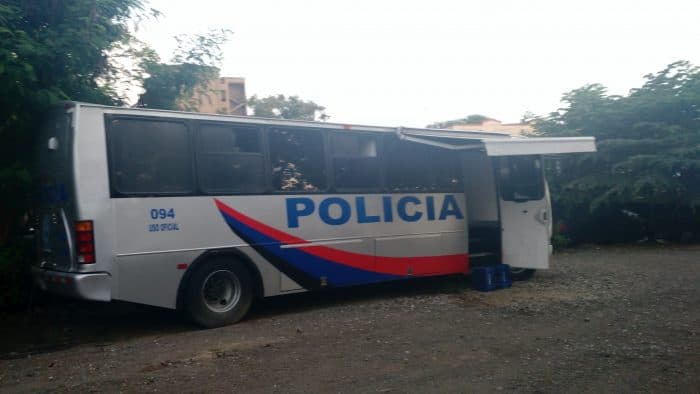
An aching pain
After they freed themselves from the belts and tried to call police, Suzye insisted that Barry go to the hospital. He was poxed with bruises and marks from the kitchen knives. She thought the attackers had broken Barry’s eardrum when they hit him over the head to open the safe.
Suzye stayed back in the hotel while a friend drove Barry to CIMA Guanacaste hospital in the provincial capital of Liberia. He was there for five hours before he signed himself out, saying he needed to get back to his wife, who was left with the aftermath of a trauma without any help coming in the night.
For the next three days, Barry laid in bed, dying amid the disorder of a turned-over second floor that the Lawsons weren’t able to touch – per police orders – so that OIJ investigators could properly assess the crime scene.
Barry had diabetes and gout. The men in his family had a long history of heart problems, which is why Barry took blood thinners. Two young doctors at CIMA didn’t tell Barry to stop taking his medication, Suzye said, so he likely continued to bleed out for days after the attack. Meanwhile, a blood clot had formed on Barry’s brain.
When a physician staying at the hotel asked to see Barry, she told Suzye: “This is serious. He needs to go back to see someone.”
That night, Barry had a seizure and Suzye drove him back to CIMA in Liberia, about 80 kilometers northeast of town, as fast as she could. When they got to the hospital, Barry had two more seizures.
A neurologist was there waiting for them, and he ordered Barry airlifted to the CIMA affiliate in Costa Rica’s capital, San José. After what felt to Suzye like a long delay, they finally boarded the helicopter and made it to CIMA’s San José hospital, where a neurologist met them on the helicopter pad. After he took Barry in and looked at the blood clot developing on his brain, he knew it was serious.
“What happened is he continued to take medication that keeps your blood thin,” he told Suzye. “Now we have to wait three days for the pressure and the blood to level itself out.”
The Tico Times contacted CIMA for comment on this story, but a spokeswoman at CIMA in San José said hospital staff are not allowed to comment on specific cases due to confidentiality policy.
While waiting for the surgery, as the pressure on his brain increased, Barry gradually lost his voice and stopped moving. Suzye stayed beside him, assuring her still-lucid husband that everything was normal. But on the third night, before the blood thinners had completely worn off and the doctors were able to go into surgery, Barry had a massive heart attack and died.
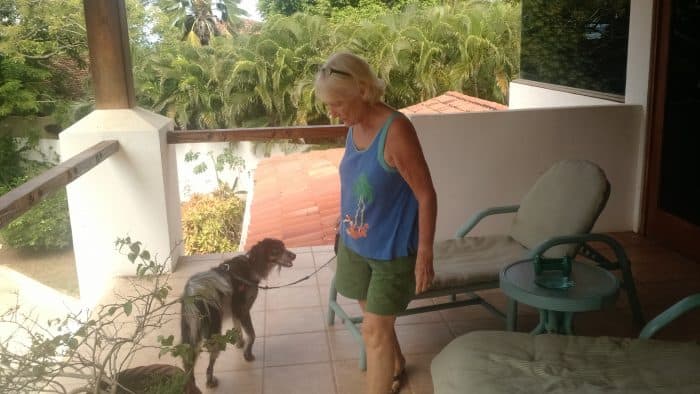
A constant tempest
After Suzye lost her husband, the accounts on her credit cards were frozen. Barely able to pull money together for the salaries of her three employees, Suzye can’t afford a security guard to help prevent more break-ins. Instead, she said, she has mapped out an escape route from the second-floor terrace where she could jump into a bed of flowers and escape.
While racing her car to get Barry to the emergency room, the radiator block began to overheat and eventually cracked. She rented a car, and when the tire popped, the rental company billed her $1,000. Barry didn’t believe in life insurance, so virtually the only money Suzye has is in a bank account that she can’t access because it was opened in Barry’s name.
In that first week after the death, equipment around the hotel began failing. The air conditioner was the first to go, right in the middle of Costa Rica’s hottest month of the year. The next week, the water tank went kaput as Guanacaste’s major drought wore on. And in the third week, the pool pump stopped working.
“It’s like at some point, all I did every day was tackle another monster problem,” she said.
Meanwhile, in the peak of high tourist season, Suzye had a hotel to run on her own. And the drought made things even harder, as guests had to bathe in the pool and relieve themselves into buckets during the half-days of mandatory water rationing.
Under the circumstances, it’s easy to assume that Suzye would go back to the United States while she tried to sell the bed and breakfast. At least one person visits each week to inspect the 20-year-old structure that is well-maintained. But the real estate market can be fickle.
Troubles and uncertainties have mounted for the California girl who worked 35 years as a medical technician and traveled the world alone. But Suzye has dealt before with situations where quick reactions and positive thinking are a necessity.
“Those skills didn’t go away,” she said. “There’s still that independence. There’s still that survival.”
Beyond the hotel, Suzye still sponsors six children through Amigos de la Educación. So she stays in Costa Rica to make sure they get through school.
A void so clear
While the men who robbed and assaulted the Lawsons remain free, a very tangible sense of doubt hangs over Tamarindo. More than six months after the town meeting where residents demanded a response from police and the municipality, justice seems as far away now as it was then. Investigators still haven’t fingered a suspect.
“You never lose hope for something like this,” said Bernard, the treasurer of ADI who has lived in Tamarindo for six years. “You need to always have faith in the system and always have faith that things can improve. I don’t want to lose faith and don’t want to have [other] people lose faith, either.”
Just as finding answers into past tragedies remains crucial for Tamarindo, so too does the ability to prevent future ones.
As one of the leaders of the short-lived security camera program, Bernard said the town has discussed the possibility of reviving a similar initiative. He estimated that it would cost $60,000 to put up a top-of-the-line monitoring system and maintain it for one year if it was all done with private funding and donations.
Police Chief López said that police in Tamarindo and Santa Cruz restarted talks with the ADI security committee about a new set of cameras earlier this month.
Though the potential lawsuit against the municipality has been pushed aside, some community members say they are reluctant to depend on the municipality and the police force.
“But still we have to make [local authorities] responsible and bring them into the boat,” said Gerner, the other head of the ADI security committee. “We can’t separate completely from them.”
The Tico Times obtained an email earlier this month sent to the Association of Residents of Costa Rica (ARCR) in which a woman claimed that men dressed as police officers entered a home in Playa Junquillal near Tamarindo that she and her husband had moved into a week earlier. After the men tied them up, she said they forced a gun into her husband’s mouth and threatened to kill him if he didn’t tell them where the money was. Eventually, the attackers realized the couple didn’t have money stored away and fled. She said it took Santa Cruz police several hours to respond and take a report, but that nothing has come of the break-in and assault.
When discussing the need for a security system to be reinstalled, Suzye Lawson said that although she has virtually no money left, she would try to make a small contribution every month for the safety of Tamarindo’s streets.
As she spoke, barking echoed off the tiled patio around the infinity pool at her hotel, breaking the morning tranquility. Her 3-year-old cocker spaniel, Manchita, which she and Barry adopted from a shelter, was letting her know it was time for the first of their daily walks.
Manchita barks more often now, after the attackers kicked her in the ribs. Strangers who come to the hotel door are greeted with a loud succession of barking from the beautiful, black-and-white dog.
The sound pierces the wind and booms beyond the white walls, into the same dusty street where three men climbed into a cab and fled into the night. Then, it all falls back to silence.
“What about that next gal?” Suzye asked. “What about the next young child? What about the trauma for them?”

